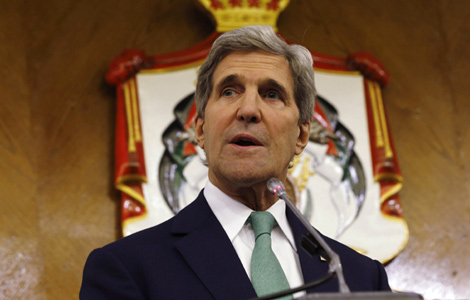Li vows growth, reform balance
Updated: 2013-11-08 09:39
By ZHAO YINAN in Beijing and CHEN WEIHUA in Washington (China Daily USA)
|
||||||||
Amid high expectations for economic reform policies to be rolled out at next week's third plenum of the 18th Party Congress, Chinese Premier Li Keqiang pledged to keep economic growth within a reasonable range and push forward with economic restructuring.
Noting that the economy has shown signs of stabilization and strength, Li said more concerted efforts should be made to accomplish this year's major tasks and create favorable conditions for the coming year.
The premier made the remarks at a meeting in northeast China's Heilongjiang province, attended by leaders from Heilongjiang, Jilin, Fujian and Henan provinces and the Xinjiang Uygur autonomous region.
The government set its annual economic growth target at 7.5 percent at the beginning of the year. That goal is widely expected to be reached, with growth for the first three quarters hitting 7.7 percent from a year ago.
Li emphasized that China's development must be scientific and feature quality and efficiency. It must also create more job opportunities and improve people's well-being.
He called for greater efforts to enhance livelihoods and to bring benefits of reform to the people.
The premier attributed China's economic recovery against the backdrop of a gloomy global economy to a correct macroeconomic policy that can "stabilize the current situation" while benefiting the economy in the long run.
The cancellation of administration approval procedures and the delegation of some government powers to lower levels, for example, have better served private investors and enterprises, he said.
In an Oct 31 meeting, Li also stressed that China will strike a balance between growth and reform.
The top leadership's repeated remarks on avoiding blind pursuit of GDP growth ahead of a major Party congress indicates that the leadership has reached a consensus that tolerates modest growth in the next three to five years, analysts said.
Reforms to be unveiled after the plenum have also attracted much attention, as the world is concerned about whether China will continue to make a sustainable contribution to global development, said Zhuang Jian, an economist at the Asian Development Bank.
"The health of the future Chinese economy will lay the groundwork for those contributions," he said.
International Monetary Fund data show that China contributed 29.8 percent of the world's net economic growth between 2008 and 2012. China's GDP growth of 7.8 percent last year, under sluggish external demand, was the slowest since 1999.
Zhuang said the next round of reforms should try to eradicate factors that hold the country back from sustainable growth. He cited problems including an over-reliance on investment and exports and unwise use of resources.
Zhang Liqun, an analyst with the Development Research Center of the State Council, said the reforms will take China's growth to a higher-level, lower-cost and more sustainable pattern.
The country's global contribution can be expected to grow in quality and efficiency, he said.
Zhao Yumin, an analyst at the Chinese Academy of International Trade and Economic Cooperation, said the past three decades of reform and opening up have taught China that it should actively integrate into the world economy.
The newly established Shanghai Pilot Free Trade Zone is a key market-oriented reform, with a series of policy experiments in trade, investment, governance and the financial and service sectors, Zhao said.
Yukon Huang, a senior associate in the Asia program of the Carnegie Endowment for International Peace, pointed out that the problem in China is not consumption, as many have suggested, but rather inefficient investment.
He believes that it is efficient investment and not consumption that will drive China's growth.
"I don't think there is a concept of consumption-driven growth," Huang said on Wednesday in a seminar on China's economic transition.
Nicholas Lardy, a senior fellow at the Peterson Institute for International Economics, pointed out that factor prices distortions have been the major source of China's economic imbalance, citing an undervalued exchange rate, a real deposit that has stayed negative for too long and a low return on energy sector assets.
But Lardy said he is not persuaded that China's service sector is as protected as most have thought.
Statistics show that China service sector imports to GDP and foreign direct investment in China's service sectors to GDP are at comparable levels with the US.
"Obviously part of the service sector is very closed, but with the service sector as a whole it is less true. So I might say the gains from increased competition in the service sector might be overstated," he said.
Papa N'Diaye, deputy division chief in the IMF's strategy, policy and review department, warned that China should be cautious with the opening of its capital account.
"One has to be careful not to open the capital account too fast because the experiences with some countries suggest that it ends up badly," he said on Wednesday at the launch of an IMF book on China's economic transition.
The book points out the need for China's internal rebalancing and urged for market-based reforms, such as in the financial sector.
Malhar Nabar, a senior economist in the IMF's Asia and Pacific department, said there is a shared recognition of the priorities in China on the issues and many of them are already reflected in the 12th Five-Year Plan (2011-15).
Xinhua also contributed to the story
Contact the writers at zhaoyinan@chinadaily.com.cn and chenweihua@chinadailyusa.com

 Brand China in leading role on Transformers set
Brand China in leading role on Transformers set
 Super typhoon Haiyan slams into Philippines
Super typhoon Haiyan slams into Philippines
 Market moves to modern mall as Lhasa safeguards the past
Market moves to modern mall as Lhasa safeguards the past
 In small-town China, movies are big
In small-town China, movies are big
 A gathering of gourmets
A gathering of gourmets
 50 arrested at LA protest over Wal-Mart wages
50 arrested at LA protest over Wal-Mart wages
 Kerry to join Iran nuclear talks in bid to reach deal
Kerry to join Iran nuclear talks in bid to reach deal
 Politicians court US-Asians amid anti-China sentiment
Politicians court US-Asians amid anti-China sentiment
Most Viewed
Editor's Picks

|

|

|

|

|

|
Today's Top News
China's discipline agency targets holiday luxuries
Chinese land reform at crucial stage
Senior official at Cosco under investigation
Li appoints advisers to key govt think tank
Taxi driver is lone suspect in Taiyuan bomb blasts
Iran talks aim to close ' important gap': Kerry
Close eye to be kept on trans fats
Shanghai leads effort to rein in housing market
US Weekly

|

|






